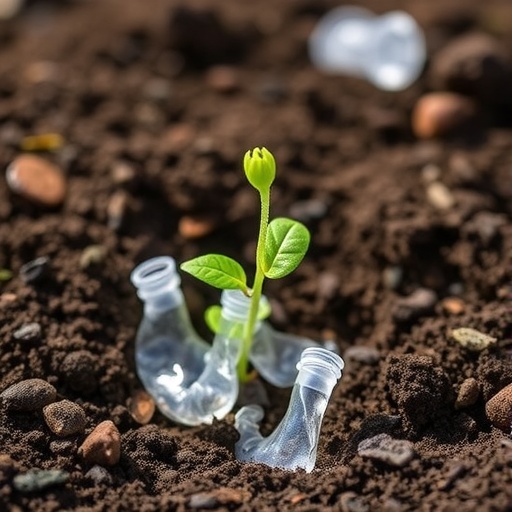In recent years, the environmental discourse has increasingly focused on microplastics, underscoring their omnipresent reality and their possible repercussions on our ecosystems. The research published by Manhas, Anjali, and Malviya explores the insidious infiltration of microplastics into soil ecosystems and their consequential impact on plant health and growth. As the world grapples with escalating pollution levels, this study sheds light on the much-overlooked effects of microplastics, examining their role in disrupting soil health and by extension, agricultural productivity.
Microplastics are tiny plastic particles, often less than five millimeters in size, resulting from the degradation of larger plastic debris or produced intentionally for various applications like cosmetics and industrial activities. Their durable nature allows them to persist in the environment, accumulating in both terrestrial and marine ecosystems. This persistence creates a fertile ground for research that delineates how these minuscule particles might affect the soil’s complex biological and chemical systems, which are crucial for sustaining plant life.
The study’s authors delve deep into the multifaceted interactions between microplastics and soil organisms, illustrating how even small quantities of these pollutants can significantly alter soil structure, fertility, and the health of microbial communities that facilitate essential nutrient cycles. Soil health is foundational for plant growth, and the introduction of microplastics may lead to a disruption that compromises not only the immediate vegetation but also the long-term viability of agricultural lands.
Furthermore, their research highlights the uptake of microplastics by plants, leading to potential bioaccumulation and alteration of physiological processes within plant systems. This phenomenon raises significant concerns about food safety and the ecological implications beyond just soil health. Considering that plants are primary producers in the food chain, any adverse effect on their development could have cascading effects through the ecosystem, impacting herbivores and subsequently, the predators that rely on them for sustenance.
The authors also investigate the pathways through which microplastics enter soils, which include wastewater irrigation, the application of biosolids, and atmospheric deposition. Each of these pathways poses a unique risk associated with the introduction of microplastics into agricultural lands and natural ecosystems. This research calls for a comprehensive assessment of the agricultural practices that might inadvertently contribute to microplastic contamination, urging policymakers for immediate actions to mitigate their spread.
An intriguing aspect of this research is its emphasis on the soil microbiome, composed of diverse microorganisms that play crucial roles in soil health. Microplastics can act as vectors for hazardous chemicals, potentially harming beneficial microbes and allowing pathogenic species to proliferate. Alteration of the microbial community presents a worrying trend since these organisms are vital for nutrient cycling and plant health, and their disruption could lead to reduced agricultural productivity.
As the global community continues to confront the climate crisis and seeks sustainable solutions for food security, understanding the implications of microplastics becomes essential. The authors of this study advocate for integrating microplastic considerations into soil health assessments and agricultural policies. This integration would pave the way for a more holistic approach to sustainability, recognizing the interplay between soil health, plant development, and broader environmental goals.
Science has long known the critical role of healthy soils in supporting agriculture, yet the potential threat posed by microplastics warrants a re-evaluation of our approaches to environmental conservation and food production. The findings underscore the urgency for further research and greater public awareness regarding the pervasive presence of microplastics in our soils.
Collaboration between scientists, policymakers, and stakeholders in the agricultural sector is essential to address this growing concern. This could encompass developing better plastic waste management practices, enhancing recycling protocols, and fostering innovations in biodegradable materials. The research illuminates the need for a collective effort to tackle plastic pollution at all levels of society, ensuring that future generations inherit a healthier planet devoid of continuing ecological damage.
Moreover, education surrounding the importance of minimizing plastic usage and encouraging sustainable practices must also be prioritized. Engaging communities in restoring and protecting local ecosystems may help mitigate the adverse effects of microplastics, fostering resilience and sustainable practices. By focusing not solely on mitigating pollution but also on fostering a culture of stewardship towards the environment, we can work towards reversing the tide of microplastic contamination in our soils.
In conclusion, the study conducted by Manhas, Anjali, and Malviya opens a critical dialogue about the hidden dangers of microplastics within soils, extending beyond mere contamination concerns. Their research brings to light the intricate connections between soil health, plant growth, and environmental integrity, thereby calling for a renewed focus on addressing plastic pollution comprehensively. The implications of their findings serve as a reminder that our interactions with the environment must be rethought in light of the emerging threats posed by human activity.
As we advance into a future facing significant environmental challenges, understanding the far-reaching impacts of microplastics is crucial. It is not merely about cleaning up our plastic waste; it is about creating sustainable systems that will protect our soils, our plants, and our entire ecosystem from the pervasive threat of plastic pollution. In the end, fostering such awareness and advocating for immediate action may hold the key to safeguarding our environmental future.
Subject of Research: Microplastics in soil and their effects on plant health.
Article Title: Ubiquitous presence of microplastics with implication on soil health and plant development.
Article References:
Manhas, S., Anjali, A., Malviya, T. et al. Ubiquitous presence of microplastics with implication on soil health and plant development.
Environ Monit Assess 197, 1043 (2025). https://doi.org/10.1007/s10661-025-14360-4
Image Credits: AI Generated
DOI:
Keywords: Microplastics, soil health, plant development, environmental pollution, sustainability, agriculture.




